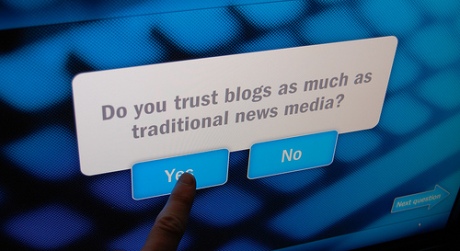Reflections …
March 27, 2009
As my blog comes to a close, I would like to write a post on what I have learned from blogging, not only from doing this assignment, or as a whole. (As I mentioned earlier, I have been blogging since I was 17 years old.)
1. It is a new media in its self.
It is not a website, yet it is. It is not a magazine, yet it is. It is not a diary, yet it is. It is not a message board, yet it is.
And yet, blogs are completely the same as what I mentioned above – but better. Therefore, blogs are a whole new media.
2. It is very different to write on blogs.
As we all know, people don’t really read what’s on the web. They scan. Therefore, when blogging, you need to add visuals to make the reader interested in your content. You cannot put a block of text and expect someone to read it – no matter how interesting. As a blogger, you should use some of these formats when writing:
- Shorter paragraphs. Write one idea per paragraph.
- Include images to draw readers in.
- Break up long text by added sub-headings, bullet points, diagrams, etc.
- Include questions in your post. Blogs are a conversation. Spark conversation in your comments section by asking questions in your post – nobody likes a know-it-all, and no one will comment if you act like one.
3. Your design means everything.
Users online are a superficial bunch. If your blog looks like a default template and has absolutely no color, there is no interest. Create a blog design that suits your personality, likes, and what you’re talking about.
4. Don’t insult an ex, your boss or your mother.
Not that I’ve done anything like this. But because blogging is becoming so popular, so are defamation of character court cases. It is probably not a good idea to bash anyone – good bad, dead or alive, on your blog. You just never know. Plus, it doesn’t give such a good impression of your character, either. Be sure to know what your legal limits are, especially for the country you’re in. For example, in Singapore, you cannot talk about the Government. At all. In fact, we better move on.
5. Blogging is fun!
Enough said.
What is Twitter?
March 18, 2009

Twitter is the latest in social media that is burning up the web. But what the heck is it?
Twitter is an account where you can have your homepage, and you can ‘tweet’ what you are doing in 140 characters or less, listening to, eating – pretty much anything you want. You can have ‘followers’ so they see updates on what you are doing.
To prove how popular Twitter is: President Obama has an account.
Tweets I’ve seen so far?
- “Should I cut my hair?”
- “Gained 5 pounds this week :(“
- “Wtf is wit u pple?”
- “Gonna visit my dad, haven’t seen him in 5 years.”
- “Dumped my bf by text, that a**hole”
- “Rude waiter at Pizza Hut, address ***** don’t go!”
- “P.S. I cheated.”
Where has privacy gone?!
Image source: http://www.twitter.com
Blog Writing Tips – Make your content scannable
March 8, 2009
Blogs are part of online publications, so the same ‘rules’ apply in terms of writing.
The biggest tip in writing online or a blog, for me as a writer online and as a reader online, is to make your text scannable.
First reason is, web readers hardly read online. The famous ‘Reading on the web’ study done by Jakob Nielsen in October 1997 concluded that readers online merely ‘scan’ the content of what you are writing.
So how do you make your blog more scannable, and therefore readable?
It all depends on your wording, your layout of the words, and what you use to accompany your text.
Darren Rowse of Problogger writes in his article, The 4 Pillars of Writing Exceptional Blogs is 1)Being Useful, 2)Write Great Headlines 3) Make Posts Scannable and 4) Write in Plain, Concise, Common-sense style.
So how do you make your online writing scannable? Here are a few, important tips:
- Start with a great headline, and an awesome opening to draw readers in. A great article to help: 5 Simple Ways to Open Your Blog Post with A Bang by Copyblogger
- Keep paragraphs short – one idea a paragraph. I’ve read the the very best is to not make it more than 3 sentences.
- Write in a conversational tone. Like in journalism, try to write like an ‘intelligent 12 year old’. This will make all readers understand what you are talking about very fast.
- Break up your text with bullet points, lists, sub-headings, colored points, and diagrams.
- Format your text: Add in italics, bold, and underline to get your point against and emphasize different ideas from others.
- Add images to accompany your text. This will draw readers in.
There we go! To sum it up, your writing should be short and sweet.
References:
Nielsen J, 1997 “How Users Read On the Web”, Useit.com, viewed March 1st 2009,
http://www.useit.com/alertbox/9710a.html
Rowse D, 2007 “The 4 Pillars of Exceptional Blogs”, Problogger.net, viewed February 27th 2009,
http://www.problogger.net/archives/2007/07/19/the-4-pillars-of-writing-exceptional-blogs/
How Blogs Have Changed the World – and Mine!
March 6, 2009

Blogging, a recent term added to the dictionary, is probably the greatest Internet sensation in today’s culture.
A weblog is an online ‘diary’ posted in reverse chronological order, meaning the latest entry is on the top. Anyone can become a ‘blogger’ – and post about their experiences, their hobbies, their interests.
But how has blogging changed the world? For one thing, almost every major media has an online weblog. Vogue magazine, TIME magazine, ABC, FOX network stations – you name it.
Generally, blogs have changed the world in a big way – there are more news outlets, opinion pieces, and overall, it is just a global conversation. It has added more depth, opinion, excitement and fun to the world. However, to make this blog post more personal (which is the point of a blog, right?) I would like to share how blogging has changed my life, personally, as I have been blogging since I was 17 years old.
A trip down memory lane …
I was in high school, when a lot of my friends decided to have an online diary at the most popular outlet at that time, Xanga. Being quite a shy individual, I too wanted a blog – but no way was I going to share with the world my inner most thoughts or what I ate for lunch that day! Instead, I decided to write about what interested me – I remember my very first blog post on my Blogger blog was about young teens and self esteem. I wanted to explore why teen plastic surgery rates were going so high, why teens suffered from body and eating disorders. Eventually, it lead to a post on makeovers – I wrote about some girls in high school (i was completely anonymous of course) and why, though they were of Asian race, they wore blue contacts and dyed their hair blonde.
This lead me to talk about a topic, to this day, I blog about – beauty.
Beauty products, news, information – how can one take care of their body, love themselves, and as women – who doesn’t love a good beauty tip?
I eventually bought my own domain name, and started a weblog/website solely on beauty.
This was back in 2005, when blogging was still fairly new, and I became one of the only beauty bloggers out there (I was one of the 3, in fact. Today there are over 2,000.)
Stats = Cash
Before long, I had stats that came to an average of 70,000 visitors per month, and I had beauty companies wanting to buy advertising and send me their products so I could talk and review about in their website.
At 17 years old, I was making a 4-figure ‘salary’ off my blog each month – pretty amazing for something I just fell into.
(Of course, I might add – having stats like this meant I actually was writing something people liked – not all blogs have this success! I was very lucky, and very hardworking!)
For example, Darren Rowse of Problogger is making a 6-figure income from his blog.
So, how has blogging changed my life?
For starters – I was making money from something I loved doing. Isn’t there a saying, If you do what you love you will never spend a day of your life working. Also, it made me know what I wanted to do with my life – I wanted to write, preferably for online content, and my dream is to have my own online magazine one day.
And lastly – it helped with my confidence in myself. Sure, my friends wondered where I got the money to spend on all that clothes and makeup I suddenly got – but it was more of the pride I had when i could say that I earned it all myself. If a clueless 17 year old like me could make an income each month over something I love to do, well, that makes me very proud. And today, blogging is now one of my passions in life.
The Future of Blogging
I predict blogging will take over websites as we know it in the future. A clue to this is if you go to musicians and some corporate websites – they are all blog based. BritneySpears.com is a weblog format, and she is one of the biggest stars today.
I think blogging will change the world, even more as it has.
And I can’t wait.
Image source: http://www.3drevolution.org
Are blogs reliable?
March 3, 2009

Are blogs reliable?
With millions of blogs being created every week, how reliable are blogs anyways? Everyone claims to know what they are talking about, whether they are in the field of the topic they are blogging about.
Why they may not be:
- Any old person can start up a blog. Blogger boasts you can get one up in less than 5 minutes. Some people may not know a thing they are blogging about.
- Spam blogs. Spam blogs are now created to ‘steal’ search engines hits from real bloggers. Their blogs looks legit, yet are full of ads. They normally ‘steal’ blog posts and put it up as their own, and are making money off it.
- With everything in the media; take everything you read with a pinch of salt.
Why they may be:
- Lots of reputable publications such as NYTimes, Times, and Vogue editors are starting up blogs. They must definitely know what they are talking about.
- Lots of respectable people are starting out blogs.
Questions to ask yourself
I Speak Of Dreams wrote an interesting post on their blog on how to evaluate the quality of information on a blog:
- Who runs this site?
- Who pays for the site?
- What is the purpose of the site?
- Where does the information come from?
- What is the basis of the information?
- How is the information selected?
- How current is the information?
- 8. How does the site choose links to other sites?
- What information about you does the site collect, and why?
- How does the site manage interactions with visitors?
In conclusion – it is all up to common sense, and it takes practice. Scanning through the content and giving those points above a quick review, and you can tell who’s real and who’s pretending to be!